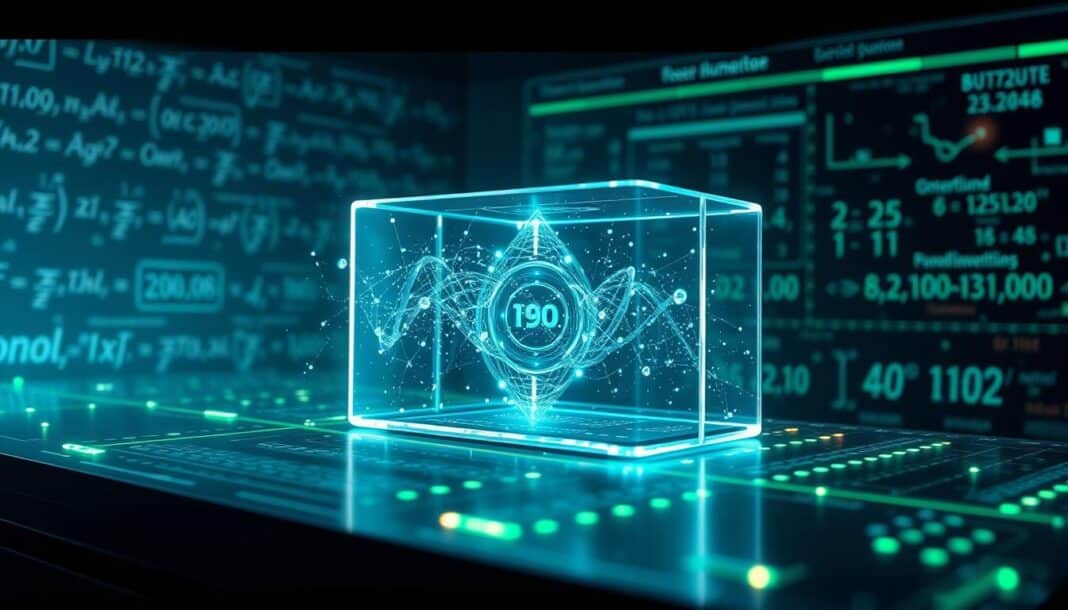Quantum mechanics is a field that fascinates many, mixing science and philosophy. It raises a big question: Can we really calculate the random probabilities in quantum systems? Or are they beyond what we can compute?
Exploring quantum theory, we face the challenge of understanding probability and predicting tiny particle behavior. This journey takes us through both classical and quantum probability. We also look at the basics of computability and the role of uncertainty in quantum systems.

We’ll follow the history of quantum probability theory and its mathematical basis. This will help us understand the mystery of quantum randomness. We’ll see if modern computation can tame the unpredictability of the quantum world.
Key Takeaways
- Quantum mechanics challenges the deterministic nature of classical probability theory.
- The fundamental concepts of computability play a crucial role in understanding the limits of quantum probability.
- Uncertainty and probability amplitudes are central to the mathematical framework of quantum mechanics.
- Algorithmic complexity and the limitations of classical computing methods pose significant challenges in computing quantum random numbers.
- The debate over the role of determinism in quantum probability continues, with theories like hidden variables and Bell’s theorem providing insights.
Understanding Quantum Randomness and Computation Basics
In quantum physics, randomness is key, unlike classical probability. Quantum randomness is unique and fascinating. It challenges our understanding of probability. As we explore quantum computing, understanding quantum randomness is vital.
Classical vs Quantum Probability Theory
Classical probability theory relies on knowing outcomes. It calculates event probabilities based on known data. Quantum probability theory, however, introduces uncertainty. This makes predicting quantum system behavior impossible.
This uncertainty, known as the uncertainty principle, is a core part of quantum mechanics. It highlights the difference between classical and quantum probability.
Fundamental Concepts of Computability
Computability theory looks at what computers can and can’t do. It’s important for understanding quantum computing’s challenges and potential. As we explore quantum randomness, computability theory offers valuable insights.
The Role of Uncertainty in Quantum Systems
The uncertainty principle in quantum mechanics shows limits to knowing certain particle properties. For example, position and momentum can’t be known at the same time. This uncertainty is key to quantum systems and quantum randomness.
“Quantum randomness is not just a quirk of nature, but a fundamental feature of the universe that holds the key to unlocking new frontiers in computing and information processing.”
Historical Development of Quantum Probability Theory
A group of scientists laid the foundation for quantum probability theory. They included Niels Bohr and Werner Heisenberg. Their work, along with Max Planck and Erwin Schrödinger, shows the power of human curiosity and science.
Max Planck’s work on black body radiation started quantum theory. Niels Bohr’s atom model introduced energy levels and probability. Werner Heisenberg’s uncertainty principle challenged old ideas of knowing everything.
Louis de Broglie’s wave-particle duality and Erwin Schrödinger’s Schrödinger equation gave us a way to understand quantum systems. These ideas from quantum pioneers have shaped our view of quantum mechanics and probability theory.
“The quantum world is a strange and wondrous place, where the rules of classical physics no longer apply.” – Niels Bohr
Quantum probability theory has led to big changes in fields like quantum computing, cryptography, and sensing. The mix of theory and experiment has driven the quantum mechanics history and probability theory evolution in recent centuries.
The Mathematical Framework Behind Quantum Computations
To grasp quantum computations, we must explore the math that supports it. Quantum mechanics, which deals with tiny matter and energy, relies on a complex math framework. This framework is key to understanding quantum computing.
Wave Functions and Probability Amplitudes
At the core of quantum mechanics are wave functions. These describe a quantum system’s state. The Greek letter Psi (Ψ) represents these complex functions. They show the probability of a particle or system being in a certain state.
The square of the wave function’s magnitude, |Ψ|², tells us the probability of finding the system in that state.
Hilbert Spaces in Quantum Mechanics
Quantum systems live in Hilbert spaces. These are abstract spaces with a special inner product. They help describe quantum states and how they change. Understanding Hilbert spaces is vital for grasping quantum mathematics and wave functions.
Measurement Operators and Eigenvalues
In quantum mechanics, observables like position or energy are measured by measurement operators. These operators change wave functions and give eigenvalues. These eigenvalues show the possible results of a measurement.
The states most likely to be observed are the eigenvectors of these operators.
The math of quantum mechanics, including wave functions, Hilbert spaces, and measurement operators, is essential. It helps us understand quantum computations. Knowing this math is crucial for creating and using quantum computing technologies.
| Concept | Description |
|---|---|
| Wave Function (Ψ) | A complex-valued function that describes the state of a quantum system. |
| Probability Amplitude | The value of the wave function, which determines the probability of observing a particular state. |
| Hilbert Space | An abstract vector space used to represent quantum states and their transformations. |
| Measurement Operators | Operators that act on wave functions to produce eigenvalues, corresponding to possible measurement outcomes. |
| Eigenvalues | The values obtained when a measurement operator acts on a wave function, representing the possible measurement results. |
Read More: iPhone 14 SIM Card Guide: What You Need to Know
Are Random Quantum Probabilities Computable?
For a long time, scientists have wondered if random quantum probabilities can be computed. Classical probability has clear ways to do this, but quantum systems are different. They are full of uncertainty and randomness, making computation tricky.
Looking into probability computation in quantum systems is key. It focuses on the randomness seen in tiny particles. This study explores randomness in quantum systems and the computational limits of predicting these random events.
- Quantum Indeterminacy and Probabilistic Outcomes: Quantum mechanics shows that some things can’t be known exactly. Instead, it gives us the chances of different outcomes. This is a big change from the fixed results of classical computers.
- Computational Complexity and Quantum Algorithms: Quantum computers can solve some problems faster than regular computers. But, making them work well is hard because of the complexity of quantum systems and current technology.
- The Role of Decoherence: Decoherence is when a quantum system loses its quantum traits because of the outside world. It adds more complexity and uncertainty to quantum probability computation.
As quantum computing grows, so does the interest in figuring out random quantum probabilities. This research is important for many fields, like cryptography and scientific modeling.
“The fundamental laws of quantum mechanics dictate that the behavior of a quantum system is inherently probabilistic, rather than deterministic. This poses unique challenges in the pursuit of computing random quantum probabilities.”
The Challenge of Computing Quantum Random Numbers
Quantum computing is growing fast, and making reliable, truly random quantum numbers is key. Quantum mechanics adds a complex layer that’s different from classical computing. This makes quantum random number generation special.
Algorithmic Complexity in Quantum Systems
Quantum systems are complex in a unique way. Their uncertainty and randomness make it hard to know what will happen next. This is because of the complex relationships between wave functions, probability amplitudes, and measurement operators.
Limitations of Classical Computing Methods
Classical computers use algorithms that aren’t perfect for quantum randomness. They can’t fully capture the randomness of quantum systems. This shows why new ways to use quantum mechanics are needed.
| Quantum Random Number Generation | Classical Random Number Generation |
|---|---|
| Utilizes the inherent randomness of quantum phenomena | Relies on deterministic algorithms that lack true randomness |
| Exploits the probabilistic nature of quantum measurements | Generates pseudo-random numbers based on mathematical formulas |
| Faces challenges due to the algorithmic complexity of quantum systems | Limited in capturing the randomness found in quantum mechanics |
“The fundamental uncertainty and probabilistic nature of quantum mechanics pose unique challenges for the computation of quantum random numbers, requiring novel approaches to address the inherent algorithmic complexity.”
Quantum Random Number Generators
In the world of computers and cryptography, true randomness is key. That’s where quantum random number generators (QRNGs) come in. They use quantum mechanics to create random numbers. These quantum entropy sources help make true randomness for many uses, like secure talks and scientific tests.
QRNGs work by using quantum uncertainty. They watch how quantum things like photons or electrons act. This lets them get truly random data that can’t be guessed or copied. Unlike old methods, QRNGs don’t have predictable patterns.
- QRNGs use quantum events like photon times, radioactive decay, or thermal noise to make random numbers.
- These quantum sources are hard to reverse-engineer and offer randomness that classical methods can’t match.
- QRNGs are used in cryptography, secure talks, and scientific tests that need random data.
The need for safe and reliable data is growing. Quantum random number generators are becoming more important. They use quantum randomness to solve the problem of true randomness. This has big implications for the future of computing and keeping data safe.

The Role of Determinism in Quantum Probability
Quantum mechanics has sparked a lot of debate, especially about determinism. Most people think quantum events are random. But, some argue that hidden variables could make everything deterministic.
Hidden Variables Theory
Physicists like David Bohm and Louis de Broglie proposed the hidden variables theory. They believe hidden factors in quantum systems decide what happens, even if we can’t see them. This idea could make quantum randomness seem less random.
Bell’s Theorem and Local Realism
Bell’s theorem challenged the hidden variables theory. It showed that quantum mechanics can’t work with local realism. Local realism says reality is separate from observation and that things can’t travel faster than light. Bell’s theorem found that quantum systems act in ways that defy this idea.
The debate between those who think quantum events are random and those who believe in determinism is ongoing. It affects how we see reality and our ability to predict quantum phenomena.
Practical Applications of Quantum Probability Computation
Quantum probability computation is changing many fields, from quantum cryptography to quantum simulation and quantum finance. This technology is growing fast. Let’s look at some ways it’s already making a difference.
Quantum Cryptography: Unbreakable Security
Quantum cryptography is a big deal. It uses quantum mechanics to make data safe. Any try to spy on messages is caught right away, making it super hard to hack.
Quantum Simulation: Unlocking Material Science Breakthroughs
Quantum simulation is key for science. It lets us study complex systems. This helps find new materials for energy, better drugs, and more.
Quantum Finance: Optimizing Investment Strategies
The finance world also benefits from quantum probability computation. It helps predict risks and improve investments. This can make money go further, even when markets are shaky.
Quantum Machine Learning: Accelerating Artificial Intelligence
Quantum machine learning is a big mix of tech. It makes AI smarter and faster. This is changing how we understand and use AI in many areas.
Quantum probability is making big waves. It’s changing industries, leading to new discoveries, and solving tough problems. The future looks very promising.

Current Technological Limitations and Future Prospects
Quantum computing has made huge strides, opening doors to new discoveries. Yet, big challenges still stand in the way. One major issue is the hardware, as quantum systems are very sensitive to decoherence.
Hardware Constraints
Keeping quantum states stable is a big challenge. Even small interactions can ruin the system. Decoherence is a big problem, making it hard to scale up quantum computers.
Researchers are working hard to solve this. They’re looking into new ways to keep quantum systems stable. This is key to unlocking quantum computing’s full potential.
Potential Breakthroughs in Quantum Computing
Despite the hurdles, quantum computing is full of hope for the future. Scientists are finding new ways to improve quantum hardware. They’re working on better qubit designs and advanced error correction.
They’re also exploring new materials and architectures. This could lead to bigger, more reliable quantum computers. These advancements could solve complex problems in quantum probability computation.
Read More: Windows Server 2022 (22H2): Unveiling the Latest Enhancements and Upgrade Considerations
FAQ
What is the difference between classical and quantum probability theory?
Classical probability deals with events we can predict. Quantum probability, however, is about the randomness in quantum systems. This randomness comes from the wave-like nature of quantum particles and the Heisenberg uncertainty principle.
What are the fundamental concepts of computability theory?
Computability theory looks at what we can compute. It uses models like Turing machines. It helps us understand if we can solve problems in quantum probability.
How did quantum probability theory evolve historically?
Scientists like Max Planck and Niels Bohr started quantum probability. Their work helped us understand quantum mechanics and its probabilistic nature.
What is the mathematical framework behind quantum computations?
Quantum computations use wave functions and probability amplitudes. These tools help describe quantum systems and their probabilistic nature.
Are random quantum probabilities computable?
Debating if we can compute quantum randomness is ongoing. Quantum systems are random, but simulating them is hard. We’re exploring how far classical computers can go.
What are the limitations of classical computing methods in addressing quantum randomness?
Classical computers can’t handle quantum randomness well. They’re based on predictable algorithms. But, quantum systems are complex and random, making classical computers inadequate.
How do quantum random number generators work?
QRNGs use quantum randomness to create random numbers. They measure photon states or electron tunneling. This randomness is great for cryptography and data security.
What is the role of determinism in quantum probability?
The debate on determinism in quantum mechanics is ongoing. Theories like hidden variables question quantum randomness. The debate on determinism is still active.
What are the practical applications of quantum probability computation?
Quantum probability has many uses. It’s good for secure communication, simulating chemistry, optimizing finance, and improving machine learning. These areas benefit from quantum’s unique abilities.
What are the current technological limitations and future prospects of quantum probability computation?
Today, quantum computing faces challenges like decoherence and scalability. But, research is making progress. We’re working on better hardware and algorithms to overcome these hurdles.
Read More: Instantly Transform Any Text Into A 100% Human-Sounding Voiceover



